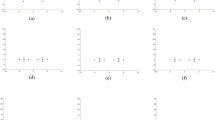Abstract
A new robust clustering scheme based on fuzzy c-means is proposed and the concept of a fuzzy mega-cluster is introduced in this paper. The fuzzy mega-cluster is conceptually similar to the noise cluster, designed to group outliers in a separate cluster. This proposed scheme, called the mega-clustering algorithm is shown to be robust against outliers. Another interesting property is its ability to distinguish between true outliers and non-outliers (vectors that are neither part of any particular cluster nor can be considered true noise). Robustness is achieved by scaling down the fuzzy memberships, as generated by FCM so that the infamous unity constraint of FCM is relaxed with the intensity of scaling differing across datum. The mega-clustering algorithm is tested on noisy data sets from literature and the results presented.
Preview
Unable to display preview. Download preview PDF.
Similar content being viewed by others
References
Bezdek, J.C.: Pattern Recognition with Fuzzy Objective Function Algorithms. Plenum Press, New York (1981)
Krishnapuram, R., Keller, J.M.: A Possibilistic Approach to Clustering. IEEE Trans. Fuzzy Syst. 1, 98–110 (1993)
Davé, R.N.: Characterization and Detection of Noise in Clustering. Pattern Recog. Letters. 12, 657–664 (1991)
Davé, R.N., Sen, S.: On Generalizing the Noise Clustering Algorithms. In: 7th IFSA World Congress, Prague, pp. 205–210 (1997) (invited paper)
Davé, R.N., Sen, S.: Noise Clustering Algorithm Revisited. In: Proc. Biennial Workshop NAFIPS, Syracuse, pp. 199–204 (1997)
Beni, G., Liu, X.: A Least Biased Fuzzy Clustering Method. IEEE Trans. Pattern Anal. Mach. Intell. 16, 954–960 (1994)
Pal, N.R., Pal, K., Bezdek, J.C.: A Mixed c-Means Clustering Model. In: Proc. 6th IEEE Conf. Fuzzy Syst., pp. 11–21 (1997)
Chintalapudi, K.K., Kam, M.: A Noise-Resistant Fuzzy c-Means Algorithm for Clustering. In: Proc. 7th IEEE Conf. Fuzzy Syst., pp. 1458–1463 (1998)
Keller, A.: Fuzzy Clustering with Outliers. In: Proc. 19th International Conference of NAFIPS, The North American Fuzzy Information Processing Society, pp. 143–147 (2000)
Kersten, P.R.: Fuzzy Order Statistics and their Application to Fuzzy Clustering. IEEE Trans. Fuzzy Syst. 7, 708–712 (1999)
Kim, J., Krishnapuram, R., Davé, R.N.: Application of the Least Trimmed Squares Technique to Prototype-based Clustering. Pattern Recog. Letters 17, 633–641 (1996)
Davé, R.N., Krishnapuram, R.: Robust Clustering Methods: A Unified View. IEEE Trans. Fuzzy Syst. 5, 270–293 (1997)
Krishnapuram, R., Keller, J.M.: The Possibilistic c-Means Algorithm: Insights and Recommendations. IEEE Trans. Fuzzy Syst. 4, 385–393 (1996)
Wie, L.M., Xie, W.X.: Rival Checked Fuzzy c-Means Algorithm. Acta Electronica Sinica 28, 63–66 (2000)
Fan, J.L., Zhen, W.Z., Xie, W.X.: Supressed Fuzzy c-Means Clustering Algorithms. Pattern Recog. Letters 24, 1607–1612 (2003)
Banerjee, A., Davé, R.N.: The Feasible Solution Algorithm for Fuzzy Least Trimmed Squares Clustering. In: Proc. 23rd International Conference of NAFIPS, The North American Fuzzy Information Processing Society, pp. 222–227 (2004)
Author information
Authors and Affiliations
Editor information
Editors and Affiliations
Rights and permissions
Copyright information
© 2005 Springer-Verlag Berlin Heidelberg
About this paper
Cite this paper
Banerjee, A., Davé, R.N. (2005). The Fuzzy Mega-cluster: Robustifying FCM by Scaling Down Memberships. In: Wang, L., Jin, Y. (eds) Fuzzy Systems and Knowledge Discovery. FSKD 2005. Lecture Notes in Computer Science(), vol 3613. Springer, Berlin, Heidelberg. https://doi.org/10.1007/11539506_57
Download citation
DOI: https://doi.org/10.1007/11539506_57
Publisher Name: Springer, Berlin, Heidelberg
Print ISBN: 978-3-540-28312-6
Online ISBN: 978-3-540-31830-9
eBook Packages: Computer ScienceComputer Science (R0)




